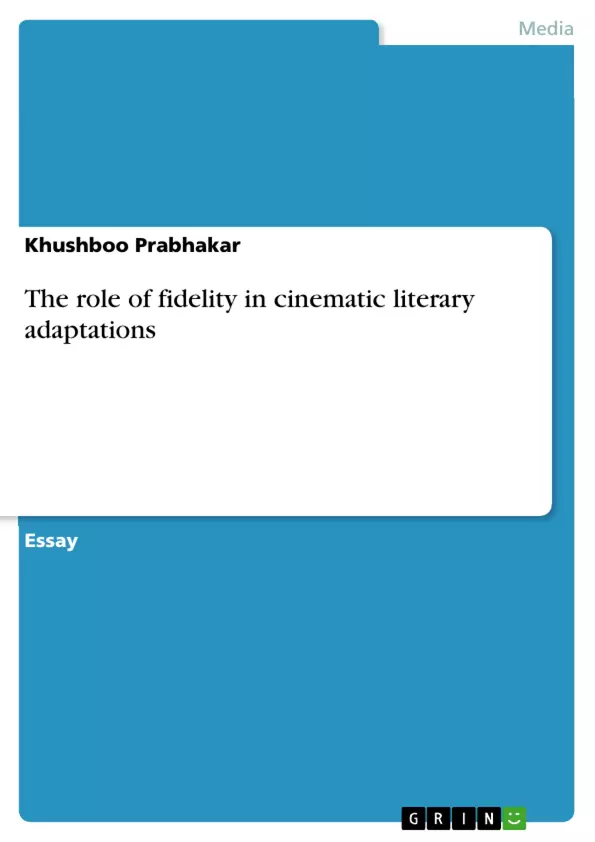In this essay, I will discuss the idea of fidelity; advancing with my exposition that fidelity, certainly, can never be achieved and hence, is a popular misconception. Furthermore, I will approach the topic of literary adaptations with a post-structuralist view and will attempt to show how cinematic adaptations are sui-generis.
Inhaltsverzeichnis (Table of Contents)
- Fidelity Discourse Analysis
- Supporters of the Fidelity Discourse
- The Undoability of Fidelity
- Media and Viewpoints
- Cinema and Literature
- The Idea of Translation
- The Binary Struggle and Cinematic Autonomy
Zielsetzung und Themenschwerpunkte (Objectives and Key Themes)
This essay aims to dismantle the misconception of fidelity in literary adaptation, arguing that true fidelity is unattainable. It will explore the limitations of the fidelity discourse and highlight the sui-generis nature of cinematic adaptations, particularly through a post-structuralist lens.
- The critique of the fidelity discourse in literary adaptation theory.
- The inherent limitations of achieving fidelity between source text and cinematic adaptation.
- The emphasis on the unique nature of cinematic adaptations as a distinct medium with its own artistic merit.
- The role of interpretation and the subjectivity of critical perspectives in both reading and film adaptation.
- The exploration of cinema and literature as separate but complementary mediums capable of eliciting aesthetic experiences.
Zusammenfassung der Kapitel (Chapter Summaries)
- The essay begins by introducing the fidelity discourse, which argues for the strict adherence to core ideas of the source text in cinematic adaptations. It critiques this discourse for its constricted view and its reliance on pre-existing assumptions about the superiority of the source text.
- The author argues that fidelity is impossible to achieve due to the inherent differences in media and viewpoints between the original author and the filmmaker. Different mediums, such as texts and films, demand distinct approaches and interpretations.
- The essay explores the complex relationship between cinema and literature, recognizing that they are distinct artistic forms with their own unique characteristics. While they may share a common goal of creating aesthetic experiences, they operate within distinct spheres and achieve their goals through different means.
- Drawing from translation studies, the author highlights the autonomy of both cinema and literature. Adaptations are viewed as a form of translation, acknowledging the inevitable need for changes and the filmmaker's expertise in the cinematic medium.
- The essay concludes by addressing the binary struggle between the verbal and the visual, emphasizing the cinematic autonomy and the need to appreciate cinema's independent identity. It critiques the tendency to dismiss cinematic adaptations by prioritizing subjective interpretations of the source text over the filmmaker's artistic vision.
Schlüsselwörter (Keywords)
The essay centers around the key concepts of fidelity discourse, literary adaptation, cinematic adaptation, post-structuralism, sui-generis, interpretation, medium specificity, translation, and aesthetic experience. It also explores the interplay between textual and visual mediums, the autonomy of cinema, and the subjective nature of critical perspectives.
Frequently Asked Questions
Is true fidelity possible in cinematic adaptations?
The essay argues that true fidelity is a popular misconception and is inherently unattainable due to the fundamental differences between literature and film.
What is the "fidelity discourse" in film theory?
It is a traditional approach that demands a film strictly adhere to the core ideas and structure of the source text, often assuming the book is superior to the movie.
How does post-structuralism view literary adaptations?
From a post-structuralist perspective, adaptations are seen as "sui-generis" (unique) works of art that involve subjective interpretation rather than objective copying.
Why are cinema and literature considered distinct mediums?
They operate in different spheres: literature relies on the verbal/textual, while cinema is a visual and auditory medium. Each requires its own artistic approach and aesthetic experience.
How can film adaptation be compared to translation?
Like linguistic translation, film adaptation requires changes to fit the new "language" (the cinematic medium), acknowledging the filmmaker's autonomy and creative vision.
What is the "binary struggle" mentioned in the text?
It refers to the tension between the verbal (text) and the visual (film), where critics often prioritize the text over the independent artistic identity of the cinema.
- Citation du texte
- Khushboo Prabhakar (Auteur), 2020, The role of fidelity in cinematic literary adaptations, Munich, GRIN Verlag, https://www.grin.com/document/889167



